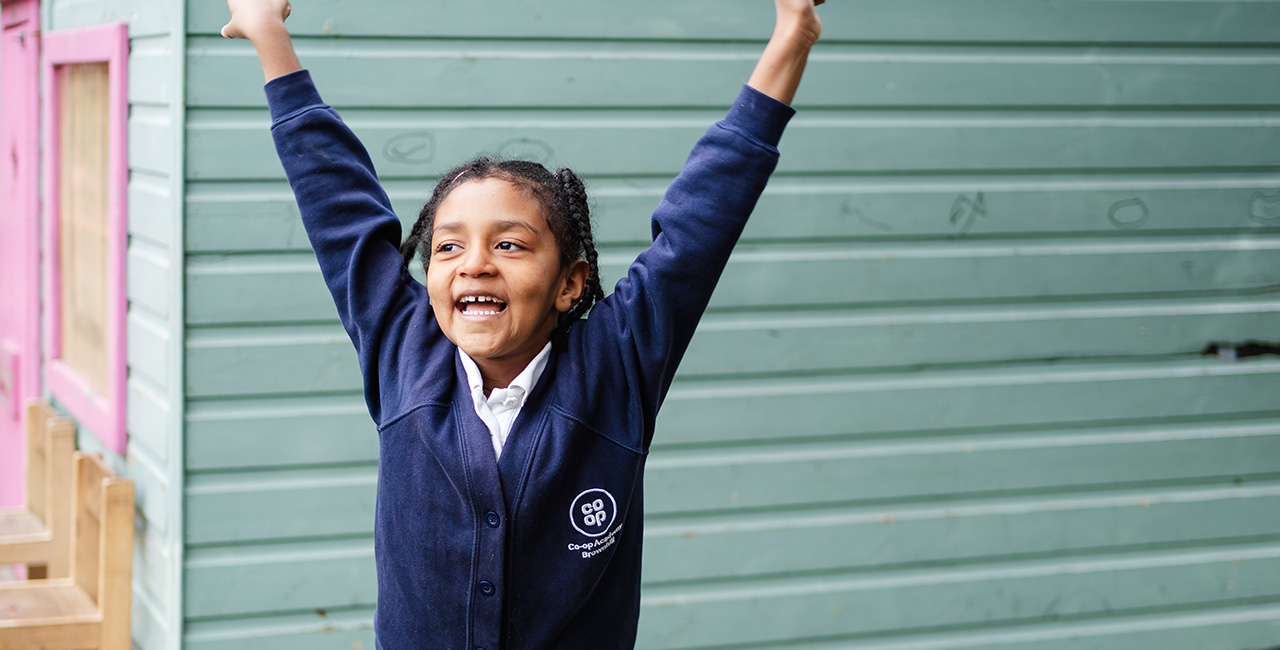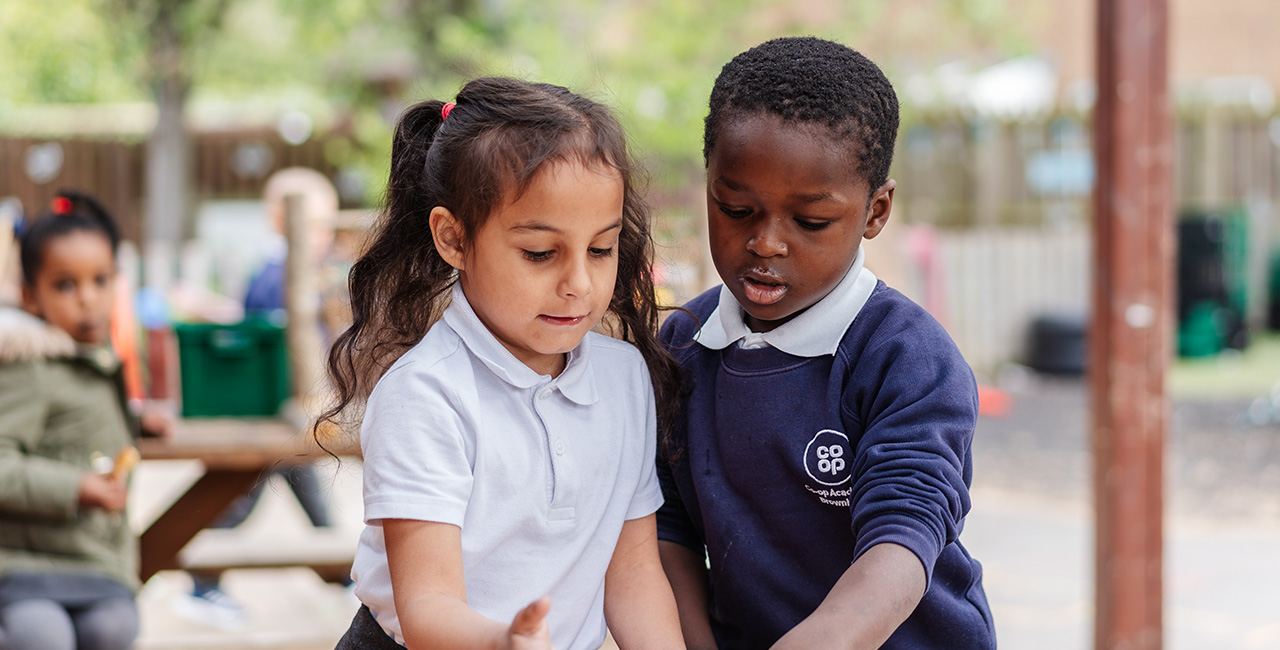Curriculum Statement
At Co-op Academy Brownhill we believe that all pupils can achieve and that our curriculum should assist them in developing deep, secure knowledge and understanding of a wide range of subjects.

The curriculum aims to build on pupils existing knowledge and skills equipping them with personal characteristics required to succeed in life and placing the highest expectations on all learners. It is our underlying belief that every child should feel valued and experience the feeling of success in a wide range of curriculum areas. We, therefore, aim to value all subjects equally and celebrate successes within them.
Reading is at the heart of our curriculum and aims to engage children in literature and the world around them. Many pupils are bilingual with 40 different languages spoken in school. Therefore, vocabulary is also important and we recognise that our children represent our socially diverse community and consider it crucial for them to develop a strong vocabulary that enables them to express themselves confidently, both emotionally and academically. Key vocabulary is mapped across our curriculum; opportunities to revisit and embed learnt vocabulary are planned for and Key facts and vocabulary for units of work are shared with families in order to further consolidate learning.
We serve a culturally diverse community and aim in all we do to celebrate differences promoting equality and equity. For example we ensure that pupils are exposed to a wide range of authors from culturally diverse backgrounds and we use subject specific role models across the curriculum to ensure that children can aspire to any goal or challenge. We also place emphasis on learning about our locality to foster a sense of belonging and community.
Our Academy is in an area of high deprivation and high unemployment and many of our children come from families where multiple generations have not worked. We are passionate about breaking the cycle by introducing possible career pathways linked to a variety of subjects and also through PHSCE allowing our pupils to explore the impact of different levels of income including benefits and encouraging enterprise. We equip pupils with life skills through the skills builder curriculum which support their social and interpersonal development to increase their employability. For example,
We are particularly proud of our extended curriculum design which supports personal development. For example pupils have access to a wide range of after school activities to identify their interest and talents e.g music, art, gardening, dance and sport.

We have a strong focus on pastoral support and enhance the curriculum with individualised sessions drawing on the expertise of a variety of specialists including speech and language therapists, play therapists, mentors. We promote well-being and emotional development of each child in which every individual realises his or her own potential, can cope with the normal stresses of life, can work productively and fruitfully, and is able to make a contribution to her or his community. Well-being garden.
The curriculum takes into account our schools unique characteristics; school location, interests of the pupils and the schools’ commitment to co-operative values. It is thematic in its approach and has been designed in the belief that children learn best when learning is based on previous knowledge and experience,
Knowledge is mapped out in each subject in an appropriate sequence to ensure that pupils remember the intended curriculum. We know that children learn best when learning is built on and repeated to deepen understanding and when children have logical connections made within many aspects of learning so they learn well and remember.
Through our curriculum we aim to provide children with new, real, rich and diverse opportunities through trips, guest speakers, residentials and after school provision, to consistently enhance their experiences and learning. We believe these first-hand experiences equip our children with lifelong memories and cultural capital that enhance and embed their learning.
Implementation
Our curriculum design is based on evidence from cognitive science and this help to inform the main principles used when implementing our curriculum. These are:
- Teachers will give the children the opportunity to activate prior learning, which is relevant to the lesson.
- Children will be exposed to new knowledge and skills in small steps, which follow the intended learning of the curriculum and do not overload the working memory.
- Teachers will deliver new content in a concise way
- Lessons will provide the opportunity to consolidate and master skills and knowledge.
- Teachers will sequence the delivery of new learning well so that students are supported in transferring this to their long-term memory
- Lessons will provide children with strong links to all relevant aspects of the curriculum allowing the children to make links between the different subjects and develop their knowledge and skills in a coherent way.
- Teachers will provide rich and diverse learning opportunities to ensure that knowledge and skills learnt are flexible and easily transferrable for children.
- Lessons will provide rich opportunity to develop vocabulary and explore the roots of words.
- Children will be given the opportunity to revisit prior learning at appropriate intervals to ensure that this is transferred to long-term memory.
- Lessons will capitalise on every second of learning.
- Assessments of pupils prior knowledge and learning will inform teachers next steps in planning.
- Enriched opportunities through visits, trips and extra-curricular activities and experiences will be planned for all children to access which presents all our children with opportunities they may not otherwise be able to experience and helps to give context to knowledge and learning.
- Lessons will be inclusive celebrating the cultural diversities in the schools and ensuring all pupils are able to access the content of their age-appropriate curriculum.
- Children will be exposed to a wide range of literature which links to children’s learning helping to give context to knowledge learnt.
- Cooperative values will be embedded throughout all learning supporting pupils development socially and emotionally.
Impact
The impact of the school’s curriculum can be seen through the outcomes of all groups of pupils and the work they produce.
We expect that:
- Our children will have a deep understanding of core skills and knowledge which then gives them confidence and ambition to access the world around them.
- Our children will become excellent, independent and enthusiastic readers.
- Our children will develop a wealth of vocabulary and communication skills which are easily retrievable from the long term memory
- Our children will demonstrate confidence, independence, resilience and a real thirst for learning.
- Our children will, through a good understanding of the Coop values and ways of being able to form meaningful relationships based upon mutual respect and trust, recognising and celebrating difference, not only within the school community but in the wider world as well.
- Our children will have access to a wide and varied curriculum, allowing each of them to excel as individuals and be the best they can be.
- Our children will be well prepared to access the challenges of the secondary school curriculum.
- Our children will have aspirations for the future and know that these can be realised with hard work and determination.
- Our children will be guided by a strong moral compass and grow up being able to make a positive contribution to the world in which they live.
Early Years Foundation Stage
Children in Nursery and Reception follow the Early Years Foundation Stage Curriculum. This learning challenges children and encourages them to develop into independent, motivated learners and thinkers, full of curiosity about the world around them within a fun, happy and secure environment.
Our Early Years Foundation Stage curriculum is based on seven areas of learning:
• Communication and Language
• Personal, Social and Emotional Development
• Physical Development
• Maths
• Literacy
• Understanding of the World
• Expressive Arts and Design
Children have opportunities to explore, enquire and to take risks through practical, hands-on learning experiences. At Brownhill, we have a high quality outside learning environment which the children are able to use throughout the day.
Phonics
Phonics sessions are taught daily at Co-op Academy Brownhill from the beginning of Foundation Stage we follow the Little Wandle Scheme of work.
The scheme is grouped into phases and pupils progress from phase 1 to phase 5, with pupils being taught in whole classes with catch up-phonics intervention to close the gaps. These phases ensure that children progress from talking about and exploring sounds, through to understanding what graphemes and phonemes are. Pupils learn about GPCs (grapheme-phoneme correspondences), consonant digraphs, vowel digraphs and trigraphs. Children develop knowledge of how to blend and segment the phonemes within words, including those with adjacent consonants. Within phase 5, pupils progress to learning about split digraphs, alternative pronunciations of the same grapheme, and alternative representations of the same phoneme. At the end of the phonics scheme, children in Year 2 progress onto the National Curriculum spellings, which concentrates on developing spelling rules and enhancing reading strategies. The reading and spelling of high-frequency words are taught throughout the academic year, as part of phonic development, along with how to spell tricky words which may not fit conventional spelling rules.
Phonics is taught in a variety of ways, including high-quality modelling of sounding out, decoding, segmenting and blending strategies. Interactive resources and games are used and children are given the opportunity to rehearse sounds verbally and record them in written work.
Phonics sessions are structured to build on previous learning and introduce new phonics skills and subject knowledge. Sessions often follow the revisit/review, teach, practise and apply the model. Sessions are planned to include opportunities for the development of speaking and listening, reading and writing.
Each June, all children in Year 1 undertake a National Phonics Screening Check. This check consists of 40 words (20 real words and 20 pseudowords) which all children will be asked to read. The focus of this check is to see if pupils can decode a range of words which they have not seen before.
For full details of our curriculum offer please visit our curriculum subject page and have a look at our termly curriculum newsletters.
Inclusion
Our inclusive culture, policies and practices ensure that all children, no matter their background or ability, receive a great education. We ensure all lessons are differentiated for our children’s requirements such as; different capabilities, special educational needs and other requirements. Please see our SEND page for more information.
